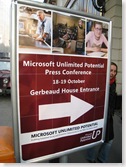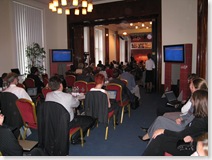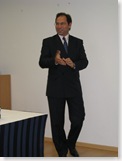UPG Launch in Budapest
October 18, 2007
We held our big press event in Budapest on Thursday and Friday this week. With most Microsoft events, we try to hold on to some important  piece of "news" that we unveil at the show in order to make it easier for journalists to write a story. In this case we did indeed have some news, but our main goal this week was to work with journalists to help establish some context on the overall approach we are taking with our Unlimited Potential strategy, with an emphasis on the impact we are making with our partners in specific countries in this region. We'll have to wait a few days to read what the press writes from the event, but I think the team in Europe overall did a good job in putting the launch together.
piece of "news" that we unveil at the show in order to make it easier for journalists to write a story. In this case we did indeed have some news, but our main goal this week was to work with journalists to help establish some context on the overall approach we are taking with our Unlimited Potential strategy, with an emphasis on the impact we are making with our partners in specific countries in this region. We'll have to wait a few days to read what the press writes from the event, but I think the team in Europe overall did a good job in putting the launch together.
The keynote speakers were Nenad Pacek from The Economist Intelligence Unit; Steven Frantzen from IDC; and Will Poole and Vahé Torossian from Microsoft.  Costas Andropoulos from the EU was also keynoting, but he had to appear via video. Nenad's speech was interesting, because he reinforced the point that government policy does matter in terms of driving economic growth; among other things he observed that Ireland and Greece had the same GDP 20 years ago, and Ireland's today is now twice that of Greece. Why? Steven Frantzen from IDC walked through country data from their recently released survey of IT spending in 82 countries, where they did an analysis of the impact of IT spending on national growth.
Costas Andropoulos from the EU was also keynoting, but he had to appear via video. Nenad's speech was interesting, because he reinforced the point that government policy does matter in terms of driving economic growth; among other things he observed that Ireland and Greece had the same GDP 20 years ago, and Ireland's today is now twice that of Greece. Why? Steven Frantzen from IDC walked through country data from their recently released survey of IT spending in 82 countries, where they did an analysis of the impact of IT spending on national growth.
Will Poole provided a good overview of our global  UPG efforts and included a video of the Romanian family I mentioned yesterday. Will also wrote an update to the UPG executive blog. Vahé (our VP for Central and eastern Europe, shown at right) discussed in more detail some of the specific programs we are doing in the region, and had an excellent guest speaker on the topic of "reverse brain drain": Bodin Dresevic, a former Microsoft development manager in Redmond who returned to his native Serbia to open a new Microsoft Development Center doing software R&D there.
UPG efforts and included a video of the Romanian family I mentioned yesterday. Will also wrote an update to the UPG executive blog. Vahé (our VP for Central and eastern Europe, shown at right) discussed in more detail some of the specific programs we are doing in the region, and had an excellent guest speaker on the topic of "reverse brain drain": Bodin Dresevic, a former Microsoft development manager in Redmond who returned to his native Serbia to open a new Microsoft Development Center doing software R&D there.
When I joined Microsoft in 1995, I think there were only four places in the world where you could work for Microsoft as a software developer: Redmond plus three small satellite offices: Montreal (SoftImage), Silicon Valley (PowerPoint), and Israel (security and MSMQ). Now it seems as a company we are aggressively opening dozens of R&D centers wherever we can find pools of talented software developers, which is great for countries like Serbia because it enables them to develop local software economies.
The "official" news from the UPG launch event consisted of the following: (grouped together by focus areas)
Transforming Education
- Family Education PC program in Romania (subject of the video mentioned above)
- IT Academies
- Microsoft Digital Literacy curricula
Fostering Local Innovation
- Microsoft Innovation Centers (including one we opened in Budapest)
- Release LiPs in new CEE languages (subject of a future post, this is a cool program for community-driven local language versions of Windows and Office)
- EU Grants Advisor (EUGA) (making it easier for SMBs to receive EU digital literacy training grants)
- IDEA Center opening in Moscow (here is a video that explains more)
- Expand Microsoft Development Centre Serbia
- Technical Computing Initiative in Russia
Enabling Jobs & Opportunity
- IDC economic impact studies for CEE
- Slovak Telecom Subscription Computing program
- Investment of US$15M in local CEE ICT projects
- 40UP program in Slovakia
- S2B (Student 2 Business) program rollout and impact
- Microsoft Digital Literacy curricula
Most of these involved particular stories relevant to individual countries. I personally did interviews with journalists from Bulgaria, Romania, Ukraine, Macedonia, Greece, Latvia, and Slovakia. They all wanted to learn more about specific initiatives taking place in their countries to improve national competitiveness. So in aggregate what we were talking about today may not seem like "big news" like a major new product announcement, but for the countries involved our UPG programs appeared to be pretty significant.